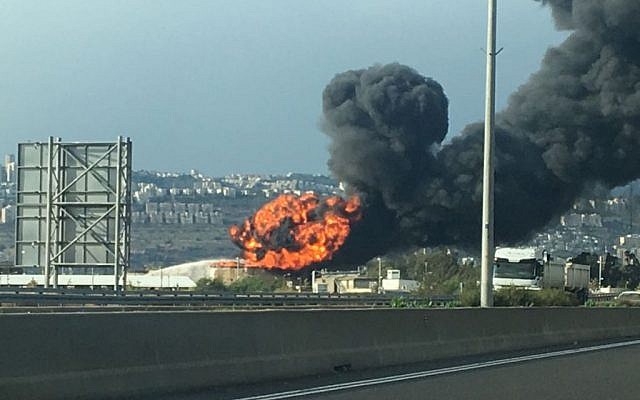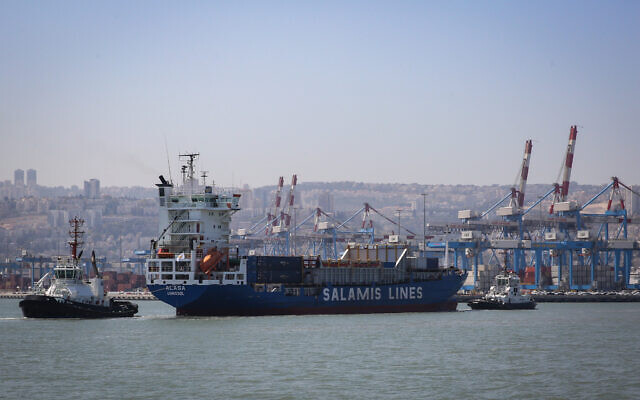The Environmental Protection Ministry on Thursday submitted its fifth indictment in seven years against Israel’s biggest oil refinery for air pollution and violation of its emissions permit.
The charge names the company, Bazan, as well as Yariv Gertz, vice president at the time of the alleged violations, and Udi Yaakov, then Bazan’s operations manager.
It relates to 15 cases of deviation from permitted emissions at 10 facilities during 2017 and the company’s failure to carry out a sampling of chimneys as the ministry requires.
This will be the fifth set of criminal proceedings advanced by the ministry against Bazan since 2015.
Bazan occupies 526 acres (2,130 dunams) in Haifa Bay, close to the most heavily populated areas of northern Israel. Its refinery imports crude oil to make a range of refined products (distillates) for industry, transport and agriculture. Subsidiaries make products ranging from bitumen for road surfaces to waxes, oils, lubricants and polymers.
Get The Times of Israel's Daily Edition by email and never miss our top stories
Over the past five years, cases brought to court by the ministry have led to convictions and court fines exceeding a total of NIS 2.7 million ($760,000 at today’s rate) against the company and its officials for causing air pollution and violating emission permits, polluting rivers, and for violations that were discovered during a probe of a factory blaze.

View of a blaze at the Bazan Group A gasoline tank caught fire at the Haifa oil refinery on December 25, 2016. (Israel Police)
An additional NIS 895,000 ($250,000) fine was imposed by the ministry in October for violation of a toxic materials permit, which also caused a fire.
Criminal proceedings have also ended in convictions and fines totaling NIS 3.7 million ($1 million) against Bazan Group subsidiaries Gadiv and Carmel Olefins.
An additional charge against Carmel Olefins was submitted by the ministry in July for air pollution and violations of the company’s emissions and business permits.
Haifa residents, backed by environmental activists, have been campaigning for years to shut the refinery complex down against a backdrop of significant air pollution and above-average incidences of cancer and respiratory disease.

View of the Haifa Bay on April 24, 2018. (Yossi Zamir/Flash90)
Last year, a top-level committee of officials set up within the Prime Minister’s Office recommended that the complex be closed “as soon as possible, and within no more than a decade.”
In March, the cabinet unanimously voted to shut Bazan down and develop it for housing and other needs instead.
However, to the disappointment of shutdown campaigners, the decision came without a detailed timetable or any budgetary commitment.
For them, Prime Minister Yair Lapid added insult to injury with his decision earlier this month to allow Israel Petrochemical Enterprises to acquire full control of Bazan, without conditioning the sale on closure within a decade.
A notice to the Tel Aviv Stock Exchange did say that the new sole owners of Bazan — David Federman, Jacob Gottenstein, Alex Passal and Adi Federman — had informed Lapid of their commitment to cooperate fully with the relevant authorities on implementing the government’s decision to develop and advance the Haifa Bay, which would include setting up a team to negotiate Bazan’s closure and compensation to do so.

Plans for a new Bay of Innovation in the northern city of Haifa after the removal of the polluting oil refinery industry, June 29 2020. (Screenshot, Knesset Internal Affairs and Environment Committee)
Thanks to its ownership of 15% of the Bazan oil refineries stock before the full takeover, Israel Petrochemicals was able to use its right of refusal to veto an earlier bid for Bazan by the Hagag Group of property developers.
Hagag evidently saw the potential in a masterplan to replace the petrochemical companies with large-scale infrastructure, residential and transportation projects in the area amounting worth billions of shekels.


